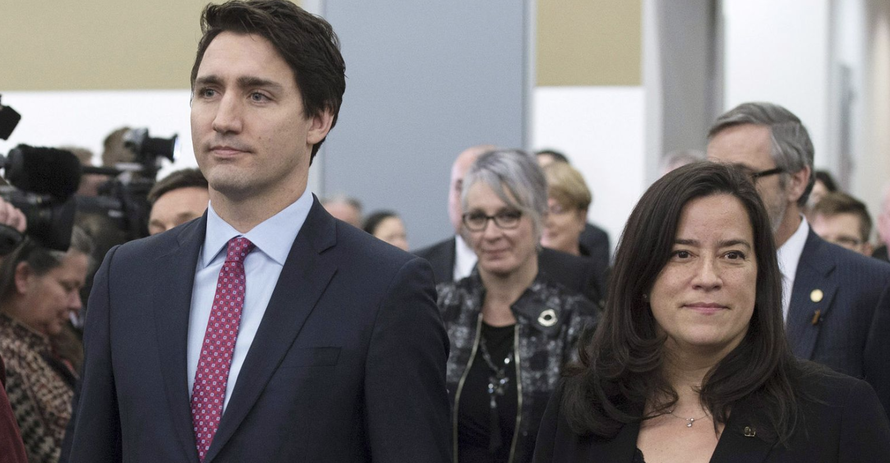As the backlash from the biggest scandal of his political career intensified, Canadian Prime Minister Justin Trudeau has seen his standing in the polls slip, losing his lead in the October race for the first time since June. Following Wednesday’s damning testimony from his former justice minister, Jody Wilson-Raybould, who accused Trudeau and his staff of a months long campaign of veiled threats and political pressure to try and coerce her into offering a deferred prosecution agreement to SNC-Lavalin, a Quebec-based engineering firm facing years old financial fraud charges.
During her testimony, Wilson-Raybould created an image of Trudeau that was strikingly at odds with the public’s perception: The cheerful liberal crusader was cast as conniving and paranoid about his electoral prospects. Intensely worried that the SNC-Lavalin case could harm his reelection prospects by moving out of Quebec and killing thousands of jobs in his district, Trudeau was willing to unduly use his office to try and influence a criminal prosecution, and, when he didn’t get his way, unceremoniously demoted the cabinet member who stood in his way.
Trudeau and Wilson-Raybould
Now, as his political opponents demand an official investigation, Trudeau’s liberals are circling the wagons. And with the conservatives already leading in the polls – one recent poll showed Trudeau’s team with 33.9% of the vote, below the conservatives with 35.8% – the Liberals worry that any break in their ranks could be fatal. So far, almost no members of Trudeau’s party have spoken out against the PM (other than Wilson-Raybould, that is, who remains a Liberal MP after resigning from Trudeau’s cabinet).
The goal now, according to one pollster, is to convince the public that Trudeau did nothing wrong. Though, the fact that one of the government’s most high-ranking members has emerged as Trudeau’s biggest critic could seriously complicate that narrative.
Any divisions within his government on the matter could be fatal for efforts to convince voters the Liberals have done nothing wrong, said Nik Nanos, a pollster with Nanos Research Group. Trudeau, at the center of the crisis and with his own popularity waning, will also need a more team-oriented campaign in the next election to win voters who may blame him for the current crisis.
“If a narrative emerges that the caucus is divided on this, that will be lethal for Justin Trudeau,” Nanos said in a telephone interview. “I can’t remember any party leader winning an election with his caucus divided. If the caucus can’t even agree, how is it that they can govern?”
Still, no current members of the cabinet have broken ranks, and some of the government’s most visible members have publicly declared their support for Trudeau, and their confidence in his judgment.
Foreign Minister Chrystia Freeland told the CBC she couldn’t imagine Trudeau applying inappropriate pressure, and signaled frustration that Wilson-Raybould was now taking aim at cabinet. “At the end of the day, when you leave the room, you have to play as a united team,” Freeland said.
Infrastructure Minister Francois-Philippe Champagne said he believes Trudeau was within the “box of what’s legal” with his actions, and that no one should jump to conclusions. “We should take the time to listen to the other witnesses.” Champagne and another minister, border security chief Bill Blair, each brushed aside a question on whether Trudeau should replace key staff. “I remain very confident in the work of this government,” Blair said.
Parliament adjourns on Friday for a two-week break, due to return in time for Morneau’s March 19 budget. The path of the scandal could also depend on what Liberal lawmakers hear while away from Ottawa, in their home districts scattered across Canada.
“They’re going to get earfuls,” Collenette said. “If the truth is really two perceptions, then voters will make up their minds. But they need facts.”
[…]
Infrastructure Minister Francois-Philippe Champagne said he believes Trudeau was within the “box of what’s legal” with his actions, and that no one should jump to conclusions. “We should take the time to listen to the other witnesses.” Champagne and another minister, border security chief Bill Blair, each brushed aside a question on whether Trudeau should replace key staff. “I remain very confident in the work of this government,” Blair said.
Meanwhile, Trudeau’s finance minister and one of his former top aides – who resigned after Wilson-Raybould exposed his role in the scandal – are doing everything they can to push their version of what transpired between them and the former justice minister.
Among those Wilson-Raybould accused of improper pressure is Bill Morneau, who she said she spoke to in the House of Commons. The finance minister said Thursday it was Wilson-Raybould who approached him, and defended the actions of his chief of staff, Ben Chin, in stressing the magnitude of potential job losses at the company.
“My role is, and continues to be, to think about how protect Canadian jobs,” Morneau told reporters in Toronto. “I will continue do that. I think that’s critically important for us to understand in every decision we take as a government.”
Wilson-Raybould also took aim at Gerald Butts, Trudeau’s former principal secretary, who on Thursday asked to be allowed to speak to a committee of lawmakers to tell his version of events. The former attorney general – whose absence from cabinet will be filled in a shuffle Friday, according to CBC – may also end up testifying again.
So far, Trudeau has told reporters that he has no plans to resign, even as the opposition and members of the press demand that he resign. Still, if MPs return from a two-week break that begins Friday having lost faith in Trudeau’s ability to win in October, we could see the party adopt a very different strategy – perhaps one that doesn’t involve Trudeau retaining his position as leader.
via ZeroHedge News https://ift.tt/2EFdXPB Tyler Durden
